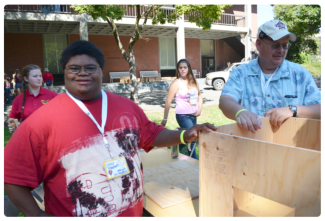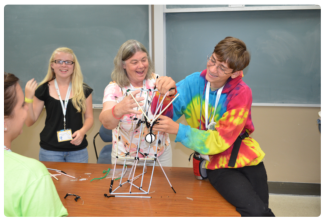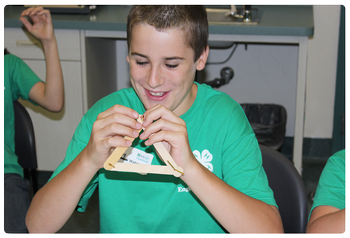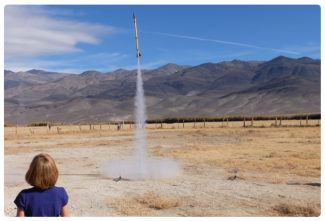About 4-H
Resources for Parents
For New Parents
New Parents Handbook - contact the 4-H Office for more information about this document.
- The Cloverpedia offers explanations and definitions of common 4-H terms and words.
- 4-H Adult Agreement As a parent in the 4-H Program, your participation is important for the success of your child. This adult agreement will outline your participation in the program and help us to better communicate in a positive manner.
- NEW Uniform Guidelines as of July 2015. This handy guide will answer your questions about the 4-H uniform.
- Leslie Carman 4H Supplies is the 4-H uniform supply shop including hats, scarves, ties, patches, record book covers and kits for making the 4-H scarf.
- The club should also provide a copy of the following:
- Club by-laws
- Club contact list
- Latest issue of the club newsletter
- Club meeting schedule and project offerings
NOTE: The above documents and information could be provided by the clubs website if applicable.
Further Reading
- T.I.E.S. Time, Interest, Enthusiasm, Safety: A New 4-H Parent Guide.
- Purpose of 4-H livestock projects
- Important Lessons Learned from a Volunteer Leader
Additional Extension Sites
- Parenting 24/7
- Money Talks 4 Teens
California State 4-H Youth Development Program Website find out about 4-H programs and activities throughout the state and learn more about the 4-H program in California.
List of Achievement Pins at the State 4-H site. This list provides information regarding the program level at which each award may be earned, as well as how to purchase them. Please note, this is a general guide and some counties may differ.
Leslie Carman 4H Supplies is the 4-H uniform supply shop including hats, scarves, ties, patches, record book covers and kits for making the 4-H scarf.
4-H Mall is the National 4-H Supply Service, an e-commerce and mail order catalog unit of National 4-H Council.
National 4-H (USDA) find out about 4-H programs and activities throughout the nation and learn more about the 4-H program in the USA and throughout the world.
National 4-H Council more information about 4-H, programs and activities available at the national level.
UC Agriculture and Natural Resources the University of California's Division of Agriculture and Natural Resources is the bridge between local issues and the power of UC Research. UC ANR also runs the 4-H program in California.
Food Safety education for Volunteers learn the UC ANR policy for providing a healthy and safe program and working environment, and to support environmentally sound practices in the conduct of UC activities. Food Safety Education is available through the University of California.
Led by research-driven programming from UC ANR, 4-H is a youth development organization for youth ages 5-19 that promotes hands-on, experiential learning. Youth members and adult volunteers from all backgrounds and locations in California are welcome. Members have the opportunity to participate in the 4-H program through afterschool programs, community clubs, camps, events, conferences, and military partnership programs.
Engaging Youth...
The 4-H Youth Development Program emphasizes enrichment education through inquiry-based learning. Youth are encouraged to discover their passions, adopt a growth mindset, practice self-reflection and set goals. 4-H projects and programs are focused around the core content areas of citizenship, healthy living, and science, technology, engineering, and math.
We have developed a "Handbook For New Families" as a guide to help understand the 4-H program. Below is the handbook as well as a "County Information" sheet that can be filled in with county contact information.
Building Relationships...

Initiating Partnerships...
The 4-H Youth Development Program maintains a unique partnership of cooperative extension with the USDA, University of California, CA 4-H Foundation, and county governments. These public partnerships, along with private benefactors, support the mission and direction of the 4-H program, advance the field of youth development, and enrich the programs delivered to youth.
Vision
Healthy, happy, thriving people who make a positive difference in their communities.
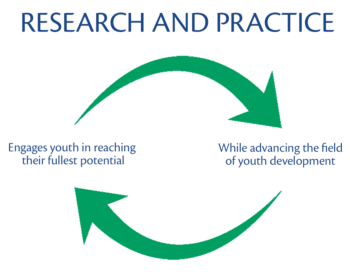
Mission
The University of California 4-H Youth Development Program engages youth in reaching their fullest potential while advancing the field of youth development.
Core Values
The University of California 4-H Youth Development Program provides a wide variety of enrichment activities with the ultimate goal of giving youth the skills they need to thrive and succeed throughout their lives. The focus of all 4-H programs is positive youth development through activities in science literacy, healthy living, and citizenship. All 4-H programs are accessible and open to all youth.
- The 4-H Youth Development Program adheres to the 4-H Vision, Mission and Values. 4-H Youth Development Program core values require that programs be:
- Responsive to California’s youth and families,
- Inclusive and diverse,
- Innovative and adaptable,
- Accountable for actions and resources,
- Collaborative and team focused,
- Honest, fair and equitable,
- Respectful of the health and well-being of people, animals and the environment, and
- Evaluated regularly and adjusted as needed to maintain effectiveness.
- Core Values are criteria for designing and implementing educational activities and measuring educational impacts based on the following:

- 4-H Youth Development Program activities focus on education and meet identified UC ANR Strategic Initiatives and clientele needs.
- 4-H Youth Development Program adult volunteers are guides to youth learning. They also respect others’ viewpoints and abilities.
- 4-H Youth Development Program programs respond to a range of individual learning styles, abilities and backgrounds.
- 4-H Youth Development Program educational activities are inclusive, not exclusive. Educational efforts are available to the public on an equal opportunity basis in accordance with the University of California and federal affirmative action/diversity policies; and are limited only by University of California Cooperative Extension resources.
- 4-H Youth Development Program staff and adult volunteers emphasize experiential “learn-by-doing” methods.
- 4-H Youth Development Program staff and adult volunteers teach new skills, validate achievement and encourage sharing of information and learning.
Read more about the California 4-H Mission and Direction (2003).
4-H Emblem
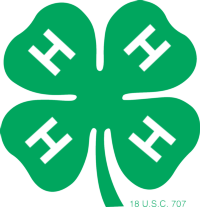
The official emblem is green with white H's - the 4-H colors. The white symbolizes purity. The green represents nature's most common color and is emblematic of youth, life and growth. The 4-H flag consists of a green, four-leaf, stemmed clover on a white background. The clover has a letter “H” in white or metallic gold on each leaf. The H’s stand for Head, Heart, Hands and Health.
The 4-H emblem symbolizes the aim and desired results of effective learning for each individual.
HEAD - Problem solving: ability to sort out complex problems.
HEART - Emotional development: developing good attitudes toward work and learning; developing acceptance and appreciation of other people.
HANDS - Skills development: ability to do, skill in doing and habit of doing.
HEALTH - Physical development: understanding and appreciating a growing and changing body.
Use of 4-H Colors, Symbols and Emblem:
- The use of 4-H symbols is optional. However, if 4-H symbols are used to publicize events or represent activities as official 4-H functions, their use must conform to certain regulations. See Using the 4-H Name and Emblem for more information.
- Suspected violations in the use of the 4-H name or emblem should be reported to the UCCE county director at the county level. Violations that extend beyond one county or a multi-county partnership should be reported to the Associate Director of 4-H Program and Policy.
4-H Motto

4-H Creed
I believe in 4-H Club work for the opportunity it will give me to become a useful citizen.
I believe in the training of my HEAD for the power it will give me to think, plan and to reason.
I believe in the training of my HEART for the nobleness it will give me to be kind, sympathetic and true.
I believe in the training of my HANDS for the ability it will give me to be helpful, skillful, and useful.
I believe in the training of my HEALTH for the strength it will give me to enjoy life, to resist disease, and to work efficiently.
I believe in my country, my state, and my community and in my responsibility for their development.
In all these things I believe, and am willing to dedicate my efforts to their fulfillment.
How does the 4-H program work?
The UC 4-H Youth Development Program Framework incorporates the best practices in the study of youth development in order to develop healthy, happy people who make a positive difference in their communities.
|
Positive youth development experiences help youth to envision and work towards their full potential. |
Youth-adult partnerships engage both members and volunteers in equal learning experiences. |
Learning Environment
We strive to create an atmosphere where youth are able to explore knowledge, share ideas, grow skills, and find their passion. Research shows that when youth are engaged and self-direct their own learning, their learning is optimized.
|
Using a proven experiential learning modelcreates an educational climate for learning through exploring, doing, and receiving feedback. |
Through project-based learning, 4-H members gain valuable experience while finding and nurturing their "spark". |



